Plastic
We fell in love with plastic when it was first invented. A direct byproduct of the oil industry, for the first time in human history, plastic provided a substance which could be manufactured in huge quantities with many special properties. Flexible, waterproof, lightweight, strong, colourful, soft, malleable, cheap, accessible. Plastic could replace much of what we'd been using for thousands of years; wood, stone, clay, metals, cotton, silk and create things we'd only dreamed of before; nylon stockings, polyester pullovers, styrofoam coffee cups, transparent acrylic, lightweight garden furniture and untold household gadgets. We weren't to know but the industrial chemists who came up with these wonder materials only a couple of generations ago should have warned us.
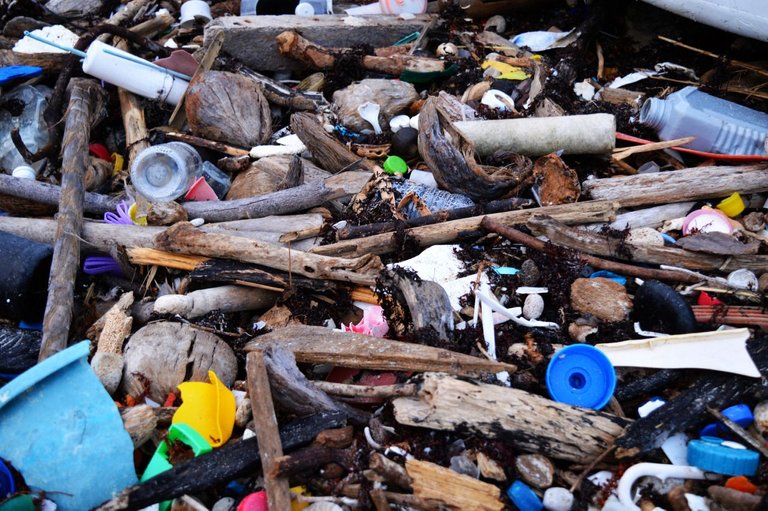
organic and inorganic beach detritus, Mexico - Carribbean Sea photo by @outerground
Plastic is not BIODEGRADABLE
Plastic is so new that nature has not had time to come up with mechanisms for digesting it. In fact a breakthrough recently came in the form of a fungi which can partly digest certain types of plastic. Fungi is the only thing which can break down the tough cellulose of plants so it's a likely candidate in the quest to dissolve the horrendous landfill sites which we've created everywhere. But plastic has a habit of entering our watercourses and they lead to the sea.
I've been to the middle of the Ocean and to desert Islands. I found myself in the Whitsunday Isles off the Eastern Coast of Australia. As remote and untouched as anywhere else I'd been. The tiny beach at Mackerel Bay was full of plastic and snorkellers and divers. Some of the plastic looked 30 or 40 years old. I knew people had visited this beach every day for years. I attempted a clean up. I took a (plastic bag) and began to fill it. Some of the people poured scorn on my attempts. it'll just fill up again with more. Others lent a hand and appreciated my gesture. It was a gesture. I had just spent a couple of hours snorkeling on one of the most amazing places in the world and I felt an obligation to take the sh*t with us. We cleaned up a huge bag in less than 20 minutes and took it back to the boat. Sure enough within a few weeks perhaps more plastic would roll in. If everyone took some with them it would help. Beach clean ups are now regular events around the world. Removing plastic from beaches is effective. Stopping it getting in the sea in the first place is the key.
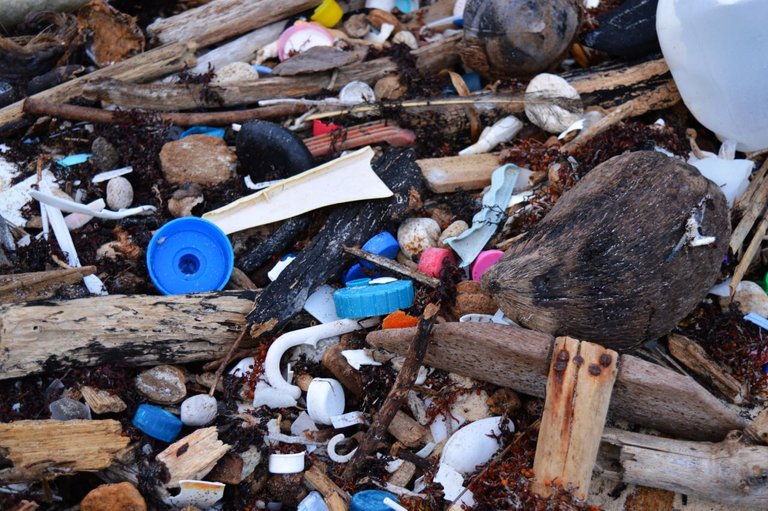
bottle tops and coconuts; organic and inorganic beach detritus, Mexico - Carribbean Sea photo by @outerground
Plastic Photodegrades
Plastic degrades in sunlight. It breaks down into smaller and smaller pieces until they are micro sized. Then the sea is full of tiny bits of plastic. The larger pieces are often eaten by sea birds and other creatures like turtles and porpoises, seals, Dolphins. These pieces of plastic when swallowed begin to fill up their digestive tracts, blocking and then starving the animals. This is a really sad sight to see. The tiny pieces get sucked up by filter feeders. They cannot distinguish food particles from plastic and by the time they are eaten by larger creatures a process of biogmagnification has begun. As larger animals in the food web eat smaller creatures, the plastic becomes magnified until large creatures have measurable amounts of plastic embedded within their tissues. Furthermore plastic has the ability to attract PCB's and heavy metals which are absorbed with the plastic. This toxic mix will undoubtedly affect the lives of sea creatures for generations to come. I collected some plastic from a beach in the Canary Isles and some from Dorset in the UK. In the middle of the Atlantic, little pieces of plastic looked like gemstones, or pebbles. I made some artwork showing their inorganic mimicry of nature. I was both fascinated and saddened by the amount I found in all colours and shapes.
Plastic Beach Hawaii
source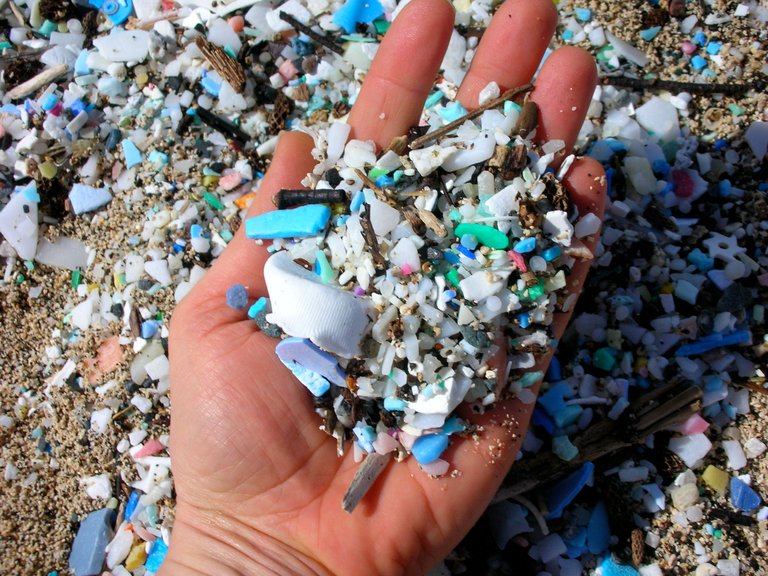
Billions of People
Billions of people around the world rely on seafood as a major source of protein. This fish is increasingly becoming contaminated. We don't yet fully know the implications of eating food rich in toxic contaminated plastic but large creatures like Beluga Whales in Canada are considered the same as toxic waste dumps. That's a clue to what lies ahead.
It's been estimated that by 2050 there will be more plastic weight for weight than life in the Ocean. That's a disaster. It's time we took measures.
Plastic Bags
We need to stop using plastic bags. In the UK a 0.05p tax was introduced to reduce their usage. We have ironically a large number or reusable (plastic) shopping bags so we very rarely buy a bag. I have a parachute silk bag by ONYA which was gifted to me about 10 years ago. It is strong enough to carry 6 bottles of wine (apparently) and I have it scrunched up in my pocket everywhere I go. There are alternatives. People often comment on America's use of paper bags. With such a large timber industry, paper bags were the obvious choice and a long held tradition for groceries. In other parts of the world, the cheap plastic bag became a normal object causing much unseen damage. biodegradable bags made from corn starch are available and plastic bags should really be legally phased out. But that's just for starters. Water bottles of which there are billions produced each year end up in the water system. Fleece jackets are hailed as the ultimate recyclers of water bottles, creating a warm yet light fabric, with wool like properties. It's also said that the ubiquitous use of fleece means that there are untold amounts of fleece fibres in the drinking water. In the US the figures are alarming and it's growing everwhere.
Plastic Beach - Ivory Coast
source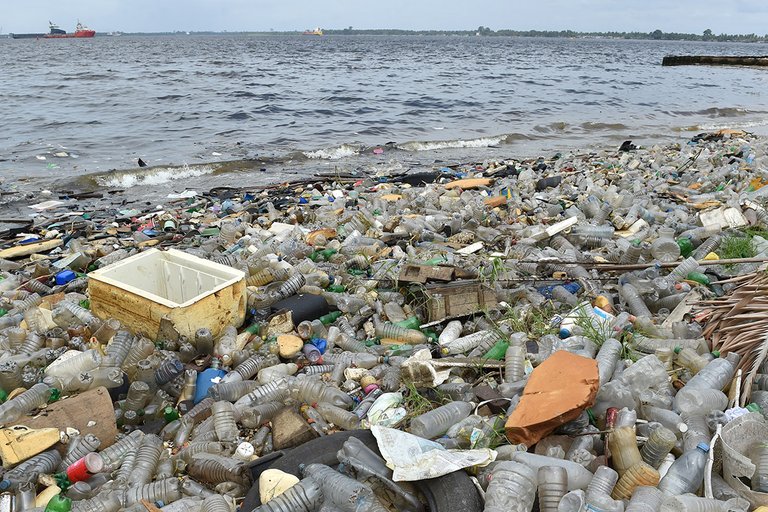
Insidious plastic beads
They are currently facing bans from many countries and it can't come quick enough. Tiny plastic beads are used as exfoliants in body scrubs, toothpastes and other skin care / abrasive products. They all end up in the drains and off to the sea. It totally short cuts the photodegrading part
The Pacific Gyre
Natural currents in the Pacific Ocean create a vortex of currents. Until about 70 years ago and for thousands of years before, this rich organic soup of debris, washed into the middle of the ocean to slowly rot down naturally, made the area in the middle of the Pacific a wonder of nature. Now there's more plastic than living things. It occupies an area larger than the state of Texas. It's enormous and it can't be tackled quick enough. There are some great initiatives to clean up the oceans and some clever technology emerging. Hopefully the plastic we remove will also remove a lot of the toxic pollution with it, but how do you remove the plastic without removing the life ? It takes about 5 million years for the detritus to end up on the ocean floor and be subducted underneath contintental plates. We don't have that long.
Pacific Gyre Plastic Soup
source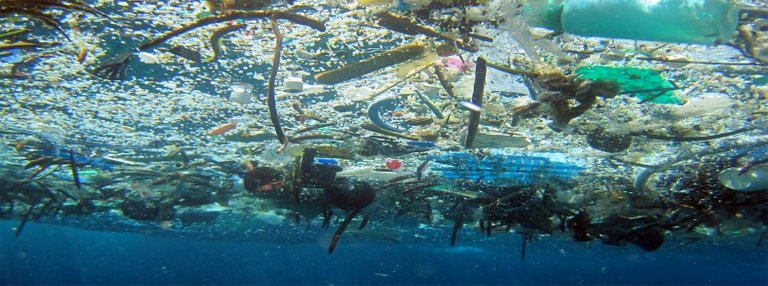
I'm hopeful
Technology and perhaps bio-technology will provide some of the solutions but we have a problem to solve. Education, removing plastic from the environment, less reliance on disposable goods. Recycling of the plastic we do use and approach to consumption which recognises our limited resources. The oil industry is focusing on directly increasing plastic production in the face of a huge future drop off in burning oil based products. Much oil goes to fertilisers, industrial chemicals and forms major components of household products and personal hygiene. Packaging for products and the products themselves form a huge industry processing cheap goods. If we consume less and buy reusable products we can all help. A reusable water bottle will require people to use them. We never buy bottled water. It's a small step. I try and buy food with no packaging but the amount of recycling we produce in a week can be quite incredible. we recycle as much as possible but I still squarely place responsibility with the corporations who can change their behaviour on behalf of us all. A bargain supermarket chain in the UK which has as pretty bad reputation is planning to do away with all plastic packaging by 2023. They are the bottom of the market. I'm hoping the rest will be forced to follow suit. Like the electric car, it should have happened 30 years ago. I hope it's not too late for us. and the fungus from the Amazon rainforest which can eat plastic, let's hope it doesn't end up eating the whole world.
solutions for catching the plastic in the Oceans are being developed using large booms
source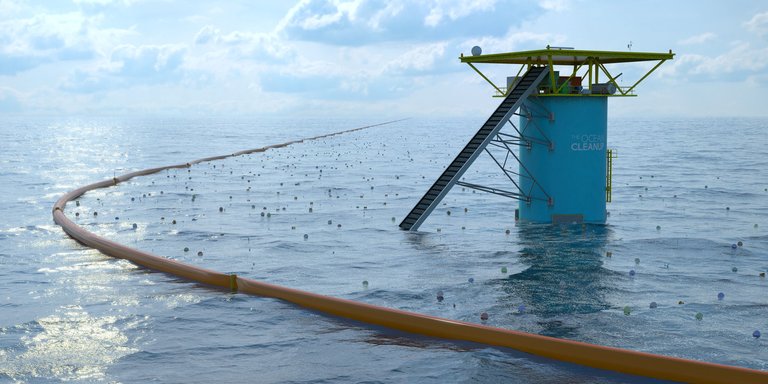
Anyone looking into saving our oceans from plastic might be interested in taking a look at this: http://thegreatbubblebarrier.com/en/home-eng/
that's a great shout @schlijk .. thanks for posting. I didn't even know about this. great idea
Your Post Has Been Featured on @Resteemable!
Feature any Steemit post using resteemit.com!
How It Works:
1. Take Any Steemit URL
2. Erase
https://3. Type
reGet Featured Instantly � Featured Posts are voted every 2.4hrs
Join the Curation Team Here | Vote Resteemable for Witness
Plastic in the Ocean or Monsanto?
https://steemit.com/health/@lighteye/corporate-world
Who will be first to destroy the World, @outerground?
And collateral question: How to awake a survival instinct?
plastic, MSTO, methane hydrate, trump take your pick ! I sometimes wonder if nature will just wash us all away :)
worries so much pollution especially because they create products that claim to protect the environment when the opposite is true, as at the time made propaganda to plastic bottles, knowing that glass containers are much less polluting and teach to reuse, too you can see a lot of that with energy-saving lamps, which contain many more polluting and harmful elements than an incandescent lamp, sometimes you do not know if the human being evolves or involutes.
true. the energy saving bulbs are full of toxic elements. I much preferred the old bulbs. As for glass bottles ! glass can be recycled indefinitely, it's made from sand but requires a lot of energy to produce. we need to get to a much better place with renewable energy. when I was a kid, we got milk in glass bottles which were taken back, washed and re-used !
Ugh. From New Jersey. Ugh. And I don't liver there anymore. Ugh.
Well at least now I am only a few miles from the Atlantic and the community is fighting to keep it fishable (its a word nowadays).
Click for Pixabay url
Suppose this is a good day. On the Jersey side of the Hudson River, would absolutely not be able to see the rear tire.
the Atlantic Side is a really important fishery. I read that Maine has the highest lobster population of anywhere and it's actually sustainable.. mainly because the rest of the species have been fished out ! I've also read that we shouldn't be eating anything bigger than a mackerel because of compounded pollutants (biomagnification) in sea food
Post your good friend
You have received an upvote from @livesustainably. I promote and curate content that encourages and educates others in living sustainably. You can support the live sustainably cause on Steemit by upvoting, resteeming and creating content under the tag #livesustainably.
thanks @livesustainably. that's great news. I am now following and will have more posts around environmental themes !